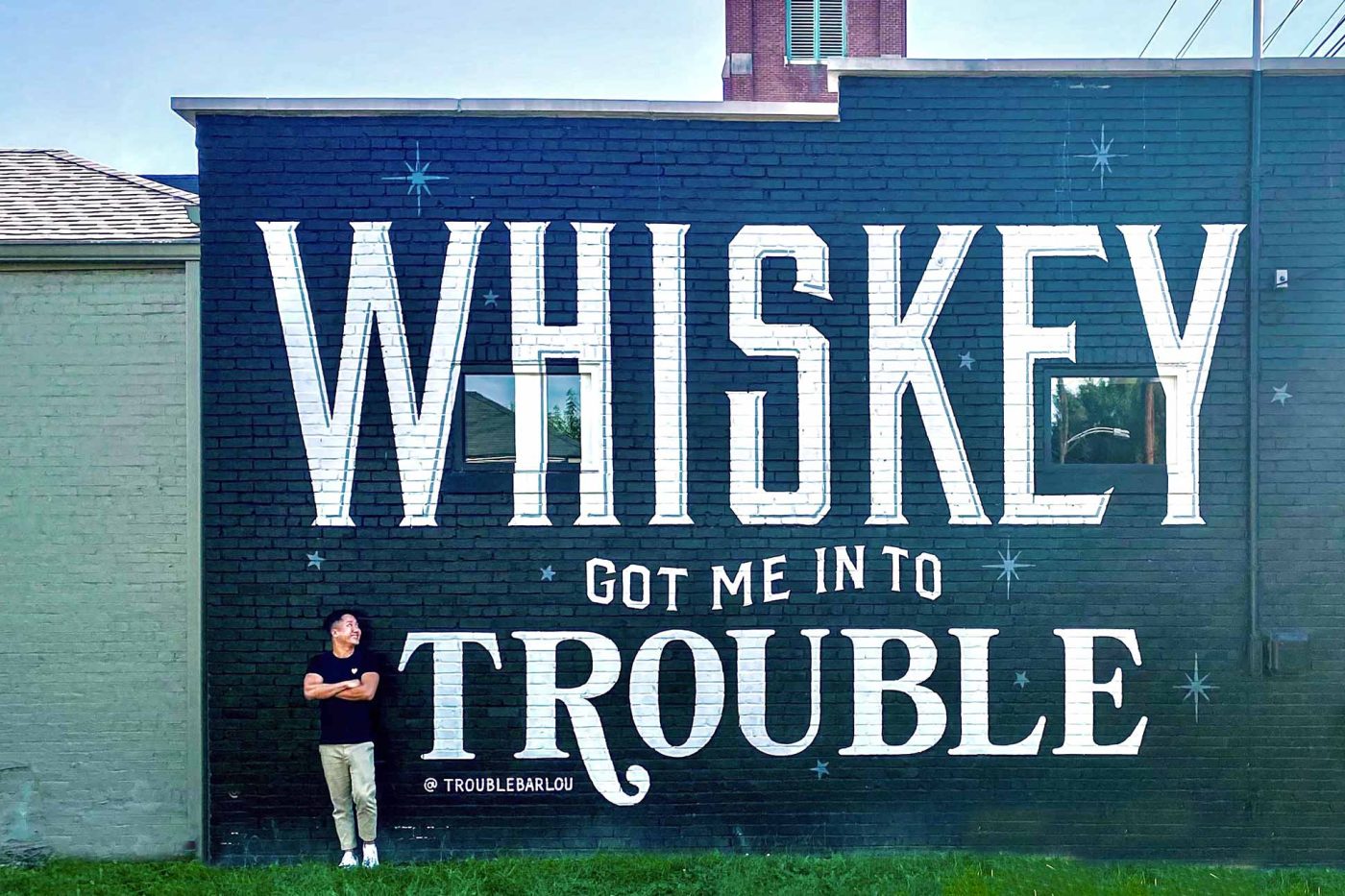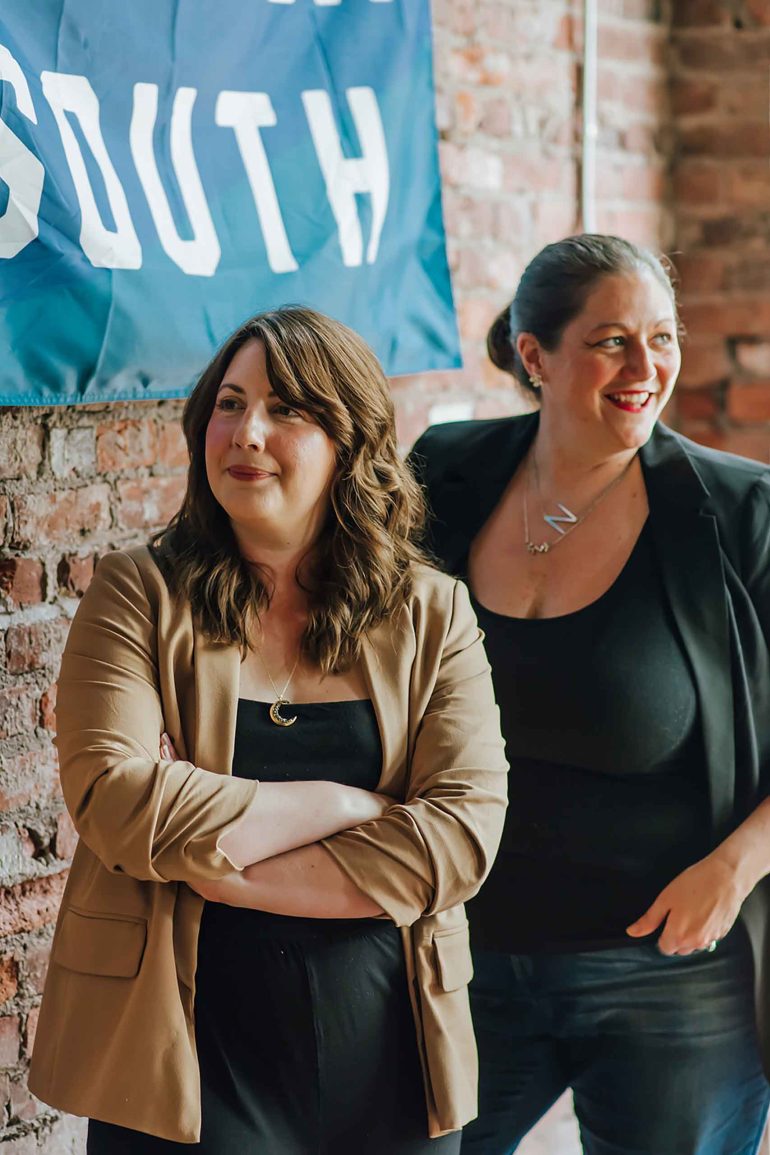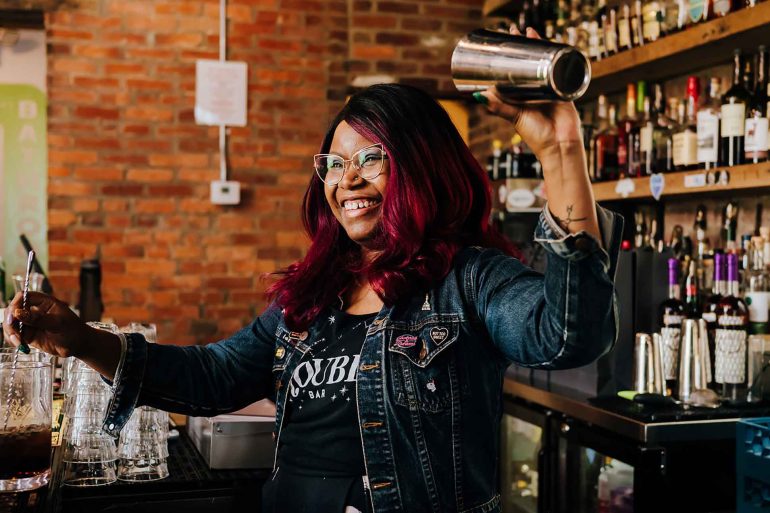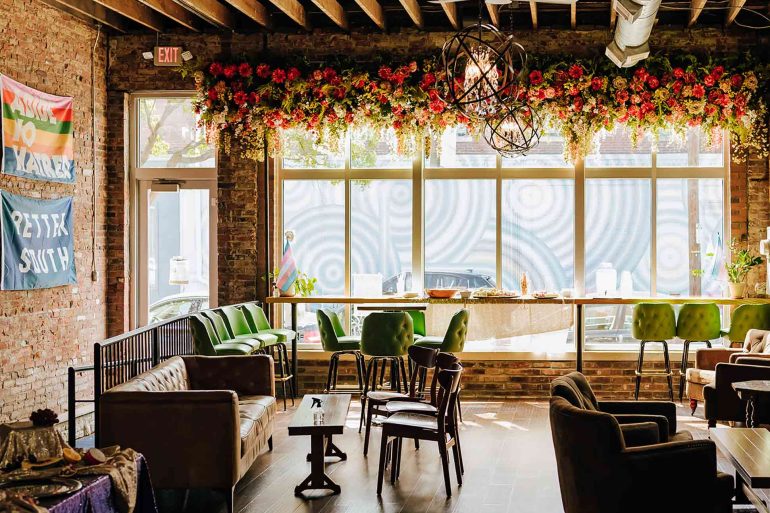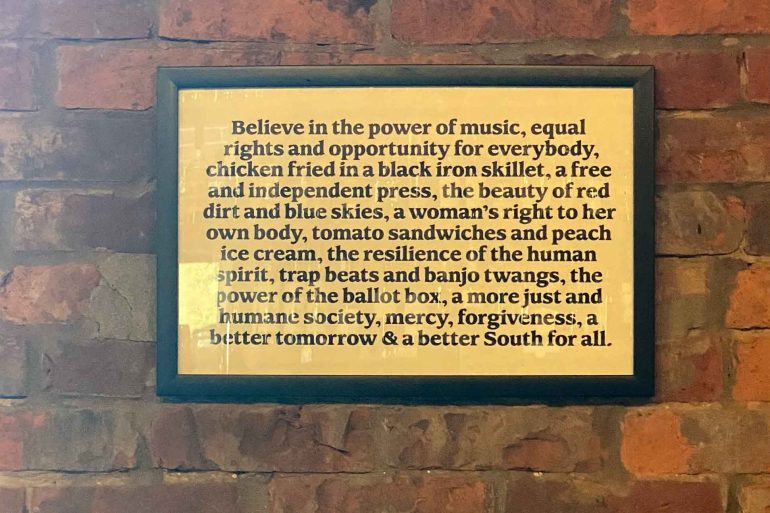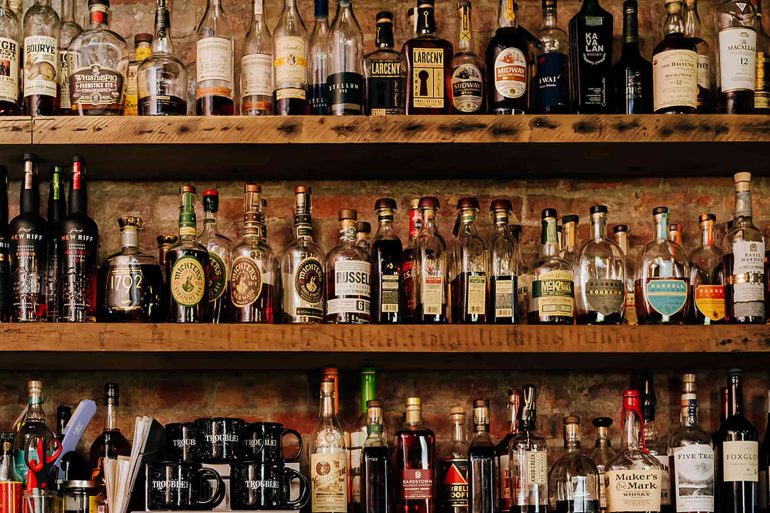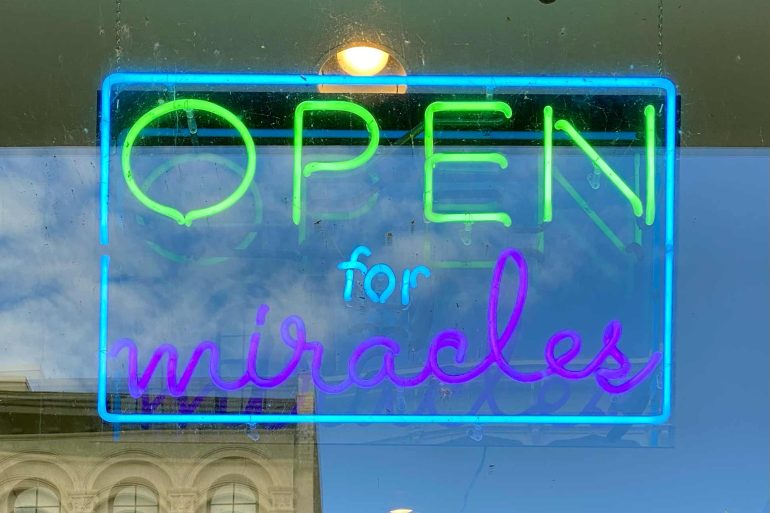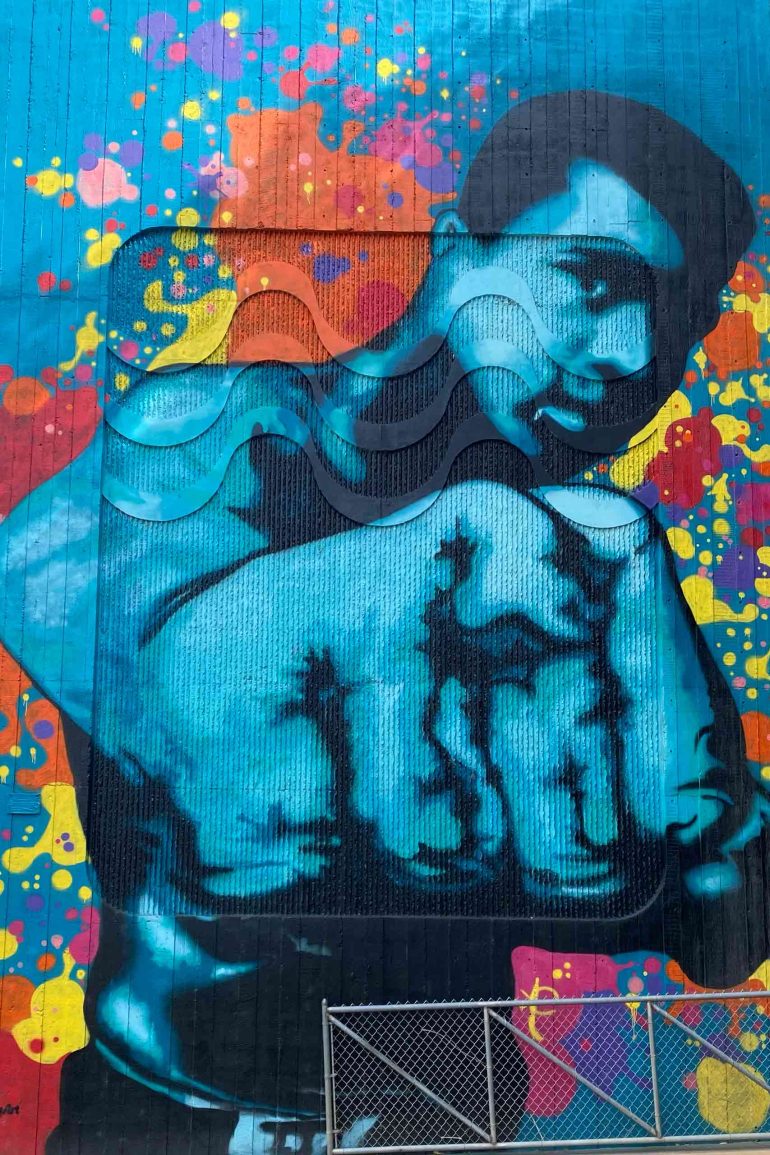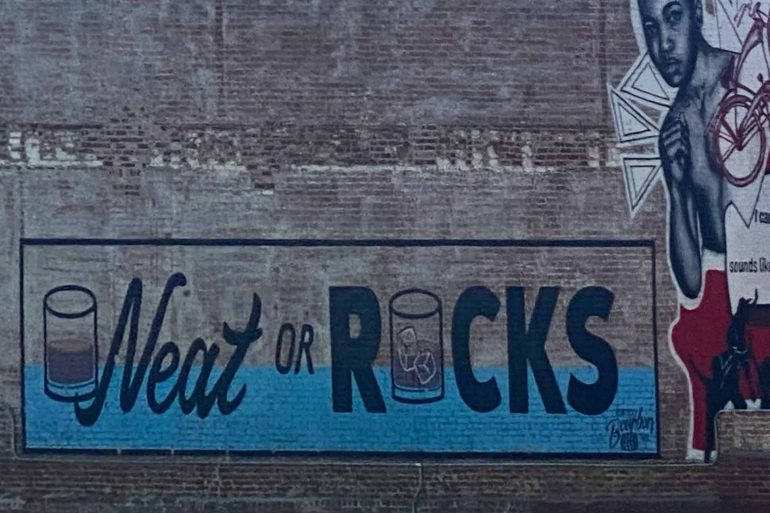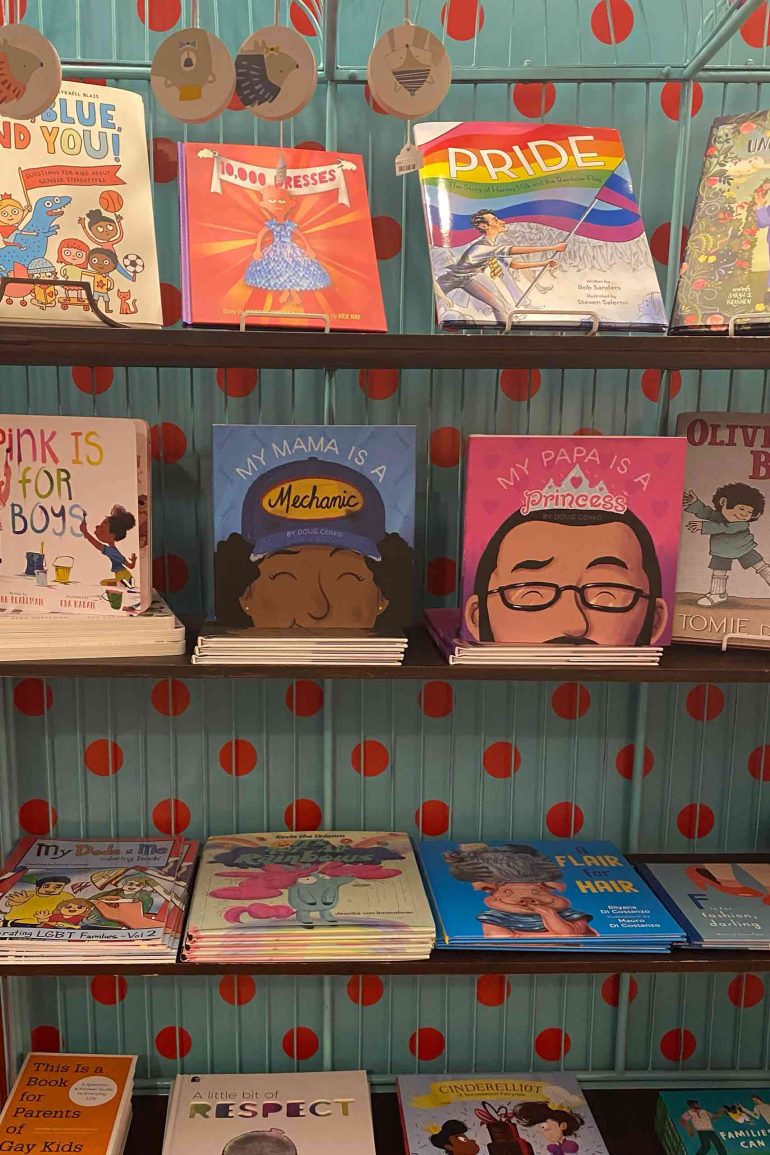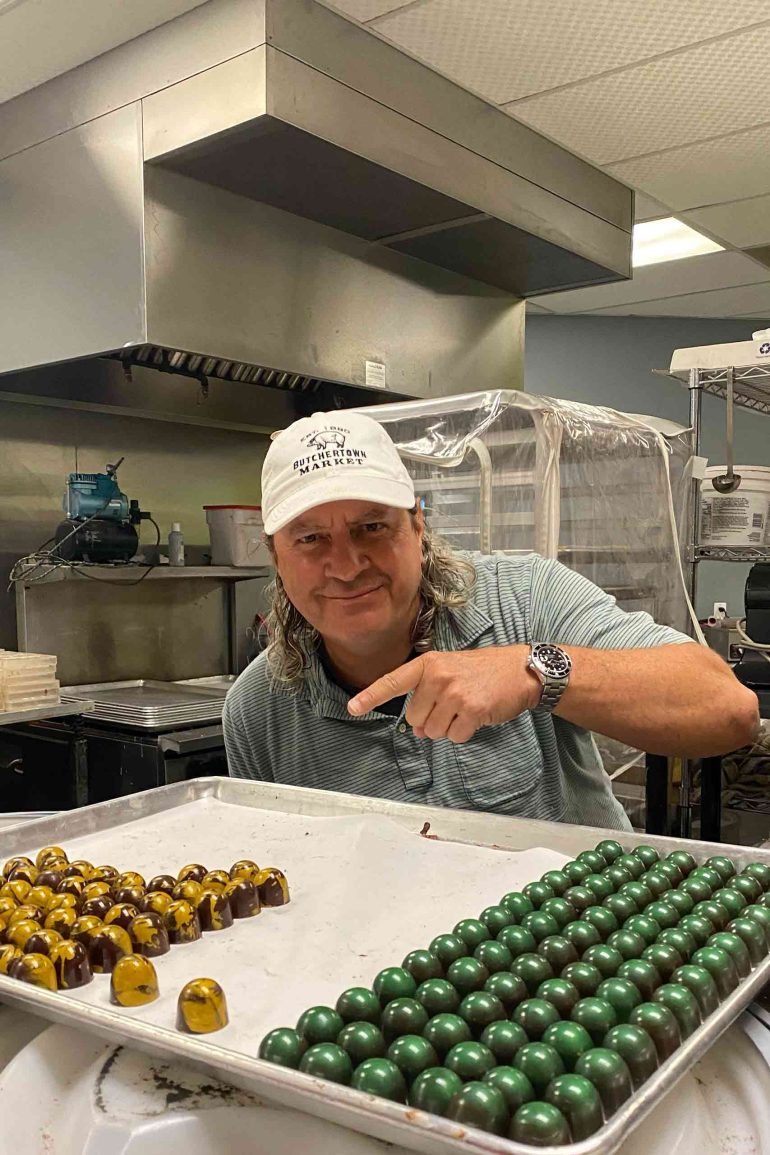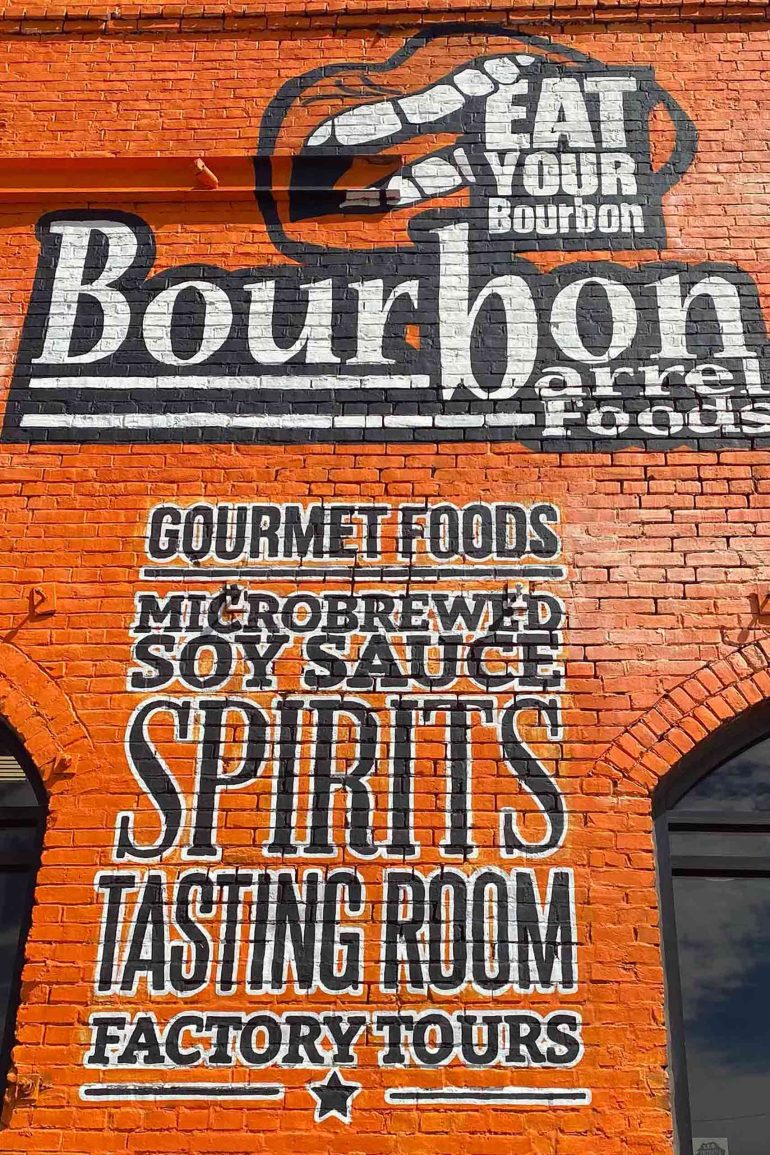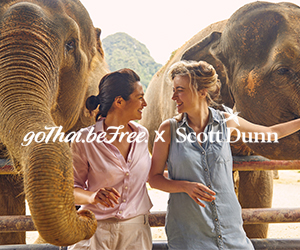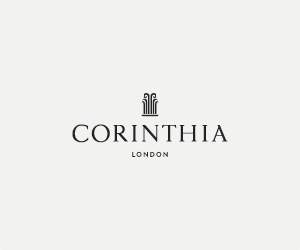While it may not be the most obvious of OutThere destinations, Louisville, Kentucky is home to a new generation of progressive people intent on changing the local landscape of bourbon-laced stories. Uwern Jong stops by to meet them and learns some surprising facts about diversity and the Bluegrass State’s finest tipple.
There’s a colossal mural, painted on the side of a building in the diverse Louisville neighbourhood of Shelby Park. It says, somewhat unashamedly: “Whiskey got me into Trouble.” Destined for the Instagram grid, it is the larger-than-life calling card of the equally spirited Trouble Bar (and headquarters for its sibling, experiential touring company, Matson & Gilman) the enfant terrible – and I mean that in the most positive of ways – of the Louisville bourbon scene.
The establishment is a bourbon lover’s gathering place with a difference: a far cry from the big-name, commercial distillery and tasting room experiences that line the old warehouse and office buildings of Main Street, downtown. Here, they claim to be powered by love, bourbon and occasional cups of strong, black coffee.
Being loud and proud is deeply rooted in the DNA of Trouble Bar. LGBTQ+ progress flag bunting lines its windows, as do pro-Planned Parenthood posters. Inside the warm, warehouse-like space, activism artwork peppers the exposed brick walls.
Trouble Bar’s colourful punters come from all backgrounds and walks of life. A thespian couple, both principals from the Kentucky Shakespeare Festival (now celebrating over sixty annual seasons) gaze into each other’s eyes in a quiet corner. Transgender DJ Victoria Syimone, a Louisville LGBTQ+ celebrity, stops by to pick up something they had left behind when they played in the bar a few nights back. A young stranger walks in shyly – as if for the first time – and stops in their tracks by the door, their eyes lighting up as they admiringly peruse the photographic wall of world-famous ‘troublemakers’ – local legend Muhammad Ali, as well as luminaries spanning from Harvey Milk to Greta Thunberg – an inspirational, activism Hall of Fame. It is not always this easy to create and cultivate a sense of belonging, but here at Trouble Bar, it just naturally permeates the air.
On the inside of the large exterior mural, is Trouble’s poignant and beautifully written manifesto:
“Believe in the power of music, equal rights and opportunity for everybody, chicken fried in a black iron skillet, a free and independent press, the beauty of red dirt and blue skies, a woman’s right to her own body, tomato sandwiches and peach ice cream, the resilience of the human spirit, trap beats and banjo twangs, the power of the ballot box, a more just and human society, mercy, forgiveness, a better tomorrow and a better South for all.”
I find these words so powerful and they go the distance to explain why we mustn’t be so quick to write off what may be perceived as conservative destinations when we travel. Many of my friends and followers from across the world, on seeing on social media that I am visiting Louisville and the Bourbon Trail in Kentucky, reach out to me. Some air their concerns and others their curiosity, about what the destination is like for more liberal-minded visitors. I’m quick to tell them that Louisville, and its 25-mile radius southwards of the Ohio River are actually ‘blue’ constituencies. And even outside its more lefty reaches, in other parts of the Bourbon Trail like Bardstown and Lexington, I have encountered nothing but inclusion: understanding, warm welcomes and like-minded people.
These are among the reasons that Trouble Bar’s owners Kaitlyn Soligan and Nicole Stipp decided to come here to set up shop. The two women met while working as social-good public affairs assistants in the corridors of power in Washington D.C., both having varied upbringings and subsequent careers across the country, prior to finding each other. They decided to move to Louisville and set up a business together, making the most of each other’s skill sets, turning their fortunes from broke assistants to business owners.
Huddled around a table, supping lovingly made Old Fashioneds, they tell me their story.
“At some point, it was clear to us both that we had to choose: either start our own company or keep crying in bathroom stalls working for other people. Carrying water for dreams that weren’t ours gave us incredible opportunities and experiences, but we both were exhausted by toxic workplace cultures and trying to convince folks we were smart enough to be at the table, day in and day out. Kaitlyn and I would talk about work and we would just keep coming back to the same boilerplate: we want to build the workplace where we ourselves would want to work,” Nicole tells me. “Plus, after living all over the East Coast, we have come to appreciate how far we can stretch a dollar here! We both also enjoy the slower pace of life in Louisville. It’s easier to connect with folks, build a community and there’s so much room for people to try new things.”
Today, Trouble Bar has nearly ten employees and has made a permanent mark on the Louisville scene. They’re thriving and have built their own family amongst each other, operating in a way that is thoughtful, healthy and kind.
“That’s what keeps us going… through the ups and downs, the disappointments, the truly joyous moments and the really hard money moments. We keep going because we think our team is building the workplace of the future and that’s something to be really proud of. But we also have a huge, extended community that has held everyone in it up through truly some challenging times, with such hope, humour and grace that it’s astounding. More than anything, we spend every day feeling lucky beyond my wildest dreams,” adds Kaitlyn. “Owning a small business as two people without any independent wealth to fall back on is not without its challenges, but it helps that we love what we do!”
“I find these words so powerful and they go the distance to explain why we mustn’t be so quick to write off what may be perceived as conservative destinations when we travel”
Cutting her teeth in big-org America, Kaitlyn used to drink without discernment, coming down really to whatever she could afford on an assistant’s budget. The watershed moment for her came when she properly learnt to taste whiskey. She had been used to wine tastings up and down the California coast and had spent a considerable amount of time in Manhattan as a gin connoisseur, but she really had to fight her way into appreciating bourbon.
The eureka moment was when she met a female guide at the Willett Distillery in Bardstown. The knowledge she imparted was clearly inspiring – it helped a great deal that it came from a woman – and Kaitlyn wanted to make it her mission to become immersed in bourbon so she could share it with others and bring people to the table that have never felt able to step up before.
“There is a long way to go when it comes to fostering greater inclusivity in the world of bourbon, although I will admit we have come a long way too. From the day we came here, we committed to that journey. We’re both women and Kaitlyn is also queer and Jewish. We show up every day as our whole selves,” Nicole says.
Kaitlyn and Nicole started designing Trouble to be truly accessible to everyone… to women, traditionally excluded from whiskey marketing; to someone who is gender non-conforming or transgender; to friends, family and neighbours with reduced mobility; to African-Americans, Muslims, Asian and Jewish people. Bourbon was the unifier, but even if you don’t drink the stuff, at Trouble, you’re welcome to partake in its culture.
“We had these questions in mind with every decision we made, and we still ask ourselves those questions every day. When you’ve only ever received messages that what you’re interested in is not meant for you, the barrier we need to help people overcome is much more significant,” says Nicole.
One of the biggest ways Trouble has reflected a diverse future for bourbon is in their hiring. In most cases, the barrier to entry as a bartender or bourbon expert is experience: people only really want to hire bartenders with experience, but how do people – especially those from marginalised backgrounds, who never really had the opportunity to engage with bourbon – get the experience if no one will hire them?
Lesser-known fact: I started my working life as a bartender in a little bar in Camden, London; and I have seen it all for myself. Many people end up getting their first job in the industry through someone they know, and over the years, this can become a self-selecting process where very few people of colour are behind the bar. Trouble’s hiring policy requires no experience at all. Instead, they look for people who understand the fundamentals of hospitality: making people feel welcome.
Felicia Corbett, who until now has been sitting quietly on the edge of our huddle – listening intently, but also surreptitiously scribbling in her notebook, conjuring up a new cocktail recipe for an important event they’re hosting at the space – pipes up. She is Trouble’s beverage director, coming with the alchemic job title of ‘President of Potions’. She is one of the original, if not the original, craft bartender in Louisville, and the first Black, female, craft bartender in the city.
Suddenly, the tongue-in-cheek ‘Hi, Felicia’ logo on Trouble’s extensive menu of cocktails, tasters and whiskey flights makes sense. As well as being their head tastemaker, she’s in charge of mothering the bar’s baby bartenders, shaping them into stewards of the craft. Her team is made up of more than half women, and over half are women of colour.
“When we show everyone that bourbon can infuse their own stories, or that beautifully crafted cocktails are for them, it starts to seep in that this belongs to us… all of us,” says Felicia. “It’s not like white men woke up one day and realised they could distill grains – humans have been distilling since the advent of fire, so we can trace distillation roots back to Africa, Egypt and beyond – which were places not occupied by white people.”
“Every single barrel of bourbon here is going to be tasted and touched by a human at some point in its life. People are what makes bourbon”
Felicia tells me that America’s distilling heritage relied very heavily on slave labour and it primarily employed women to fill bottles and pack boxes. Louisville’s Jewish immigrants sold bottles at apothecaries and there have certainly been genderqueer folks in the industry since the beginning, so the stories of Kentucky bourbon is diverse and certainly worth sharing.
Perusing the experiential menu here, it’s plain to see what Trouble’s vision for the future of bourbon looks and tastes like. The cocktails are innovative; and the way everything is explained is educational, entertaining, but furthermore inclusive. Collaborations are also something that Felicia values. They’ve linked up with another female trailblazer whom I’ve encountered on my bourbon journey, Peggy Noe Stevens – credited as one of the industry leaders responsible for branding the Bourbon Trail into the highly marketable hospitality experience it is today. Queer, Black, sober-society, tea-brewing, event organisers, Sis Got Tea has also provided help with Trouble’s non-alcoholic offering.
Nicole adds, “What I always go back to, is that at the end of the day, every single barrel of bourbon here is going to be tasted and touched by a human at some point in its life. People are what makes bourbon. Bourbon, because of its particular laws and simply because it is a barrel-aged spirit, has to be quality controlled by humans, for the human palate. So people should be the most important part of the storytelling!”
“Kentucky bourbon people, while we’re spread out across the state, are part of a close-knit, neighbourly community. People go back generations, and what we have found is that they welcome new folks in a way that feels like a blessing. They support each other through the hardest times, love each other, check on each other, make fun of each other… and this is across the entire industry. Where you might expect companies to feel competitive, we’ve only ever seen them be supportive. And when you go to big industry events, you see how close everyone is. We thoroughly advocate engaging with bourbon, not just by drinking it, but by meeting the people who make it,” says Kaitlyn.
These bourbon bonds proved invaluable to Kaitlyn and Nicole. There is a huge appetite for private bourbon tastings and Bourbon Trail tours in Trouble’s signature, safe and celebratory way. Their sibling bourbon experience company Matson & Gilman has always been about more intimate and premium distillery experiences, since its founding in 2016. But it wasn’t until the COVID pandemic hit that distilleries became more concerned about maximising the value of smaller groups.
“While I don’t think ‘easy’ is a term that could ever be applied to evolving how this industry works, we certainly found a lot of wide-open arms and minds as to how we wanted to do things, especially from people who wanted to welcome the clientele we work with,” says Kaitlyn. “We are bourbon people now, but our social-good past is still alive and kicking and it informs what we do today.”
“There’s no beating around the bush, the national vision of Kentucky‘s politics is pretty grim, but I’ve never met more radical activists and organisers than I have since moving here. We both started our careers in progressive politics, so we had a real appetite to be plugged into those communities here and there is no shortage of groups doing the work because there is definitely work to be done! There’s a really inspiring ‘we are all we’ve got’ mentality to so much of the grassroots work here, that always makes me feel so hopeful,” says Nicole.
Elsewhere in Louisville, Felicia’s passion for uplifting people from marginalised communities into the bourbon industry is shared by other leaders. At Copper & Kings distillery (who actually make brandy, not bourbon – try that for revolutionary), in the up-and-coming, street-art-covered, ‘meat packing district’ of Butchertown, its South African beverage mogul founder, Joe Heron spearheads a diversity-in-bartending project known as the ‘Ideal Bartending School’.
In 1917, three years before Prohibition, Tom Bullock, a bartender in St. Louis (some 250 miles away from Louisville), published a cocktail book called The Ideal Bartender. He was the first African-American bartender to ever publish a cocktail journal, but his work particularly resonated with Joe, because Bullock was actually a Louisville native.
“Just across the tracks from Butchertown is a rapidly gentrifying neighbourhood called NuLu (New Louisville). It bears a striking resemblance to other hipster neighbourhoods in America, but it comes with a thick Louisville (and with that, bourbon-laced) accent”
So, to celebrate Bullock’s hundred-plus-year legacy, the Ideal Bartending School is a landmark project that’s all about addressing the balance for women and people of colour in bars and liquor-related enterprises, by training them in the fundamentals of bartending, under the mentorship of some of the industry’s most illustrious leaders. You could call it a leg up to setting the bar! It’s a programme that’s all about inclusion, but also economic mobility. Just a few years in, the benefits can already be seen with the school’s graduates securing roles and rising quickly in some of Louisville’s biggest hospitality outlets.
At Butchertown’s retail landmark, the Butchertown Market, owner Andy Blieden proudly shows me around his expansive space that is home to some truly progressive retail businesses. Beyond the crafts, clothing and young makers that you usually see in such markets, a number really stood out and surprised me. Here, a North-Eastern British chocolatier is adding his own Geordie spin to bourbon balls; a clothing stall is promoting its new ‘made in Louisville’ collection of unisex fashion; a little bookstore sells gender-neutral affirmative and heartwarming LGBTQ+ children’s books, many by Kentucky-based authors and illustrators; and a soy sauce brewer (who ferments in used bourbon barrels) has become Andy’s biggest tenant and the US’s biggest micro-brewed, craft soy sauce manufacturer. Bourbon Barrel Foods also has a foodie-oriented kitchen and tasting room and hospitality concept.
Next door, TEN20 Craft Brewery, another Butchertown success story (now with four outlets across Louisville) has grown to become another local voice to drive diversity. Their marketing war cry is ‘Bringing people together… for good’ and this manifests in many ways for those from diverse communities. For me, it is touching to see them support Louisville’s LGBTQ+ Pride celebration, hosting a number of community-centric events like drag brunches. They even brewed and released a special edition Pride beer, ‘Berry Proud’.
Speaking of Pride, just across the tracks from Butchertown is a rapidly gentrifying neighbourhood called NuLu (New Louisville), with its grid of concept stores, home décor outlets, bars, cafes and restaurants. It bears a striking resemblance to many other hipster neighbourhoods in America, but it comes with a thick Louisville (and with that, bourbon-laced) accent.
It is home to many trendsetting, LGBTQ+ households and has risen in notoriety as a result, to become one of the city’s most desirable residential neighbourhoods. NuLu and its adjacent Highlands neighbourhood play host to the Louisville Pride Festival (otherwise known as PrideFest), with celebrations taking place annually each September. Alongside the Kentuckiana Pride events in June, it celebrates over fifty years of Louisville’s Gay Liberation Front, first founded in 1970, just a year after the Stonewall Riots in New York City.
In that same year, a lesbian couple, Marjorie Jones and Tracy Knight sued Jefferson County for denying them a marriage licence. In 1982, the first Pride Picnic was held, followed by the first Pride March five years later. The event has come a long way and on its 40th anniversary, it is moving for me to experience it, learn about the city’s storied LGBTQ+ history and see just how brilliantly the community bands together.
In my time in Louisville, I am surprised to have seen and experienced so much that goes against my previously uninformed preconceptions of what Kentucky’s capital would be like.
Yes, sometimes the very apparent moments of conservatism can be a hard pill to swallow for a left-leaning traveller like me… an example being the sporadic, anti-abortion billboards (Kentucky was an automatic trigger state post the overturning of Roe v. Wade by the U.S. Supreme Court) that litter the city. But of course, blue ol’ Louisville is the pro-life campaigners’ battlefield, so it comes as no surprise.
But organisations like Trouble, Copper & Kings, Butchertown Market, TEN20 and Louisville Pride; as well as the people behind and in it, are pushing back on all of this in a socially-driven, innovative, entrepreneurial spirit of community that’s powerful, yet endearing. They offer fantastic and unique reasons to come here as a tourist: in their world-class hospitality experiences, which are, as a mural in the Highlands says perfectly: “weird, independent and proud.”
Moreover, coming here highlights just why it’s important that we make an effort to visit, support people like them and do our bit to contribute to the progress of the wider destination. Their visibility, front and centre of Louisville’s and Kentucky’s most valued industries, compounded by the visibility and halo effect that comes with our support, can’t but have a positive and progressive impact on the social fabric here too.
Uwern was guest-in-residence at The Grady during his stay in Louisville. For more about Louisville and the rest of the Bluegrass State visit www.kentuckytourism.com. For the very latest about Louisville, head to the city’s tourism website at www.gotolouisville.com. Kentucky Tourism Department has partnered with Brand USA – the destination marketing organisation for the United States – to showcase the state’s bourbon tourism experience in a two-year partnership. Follow along for everything that’s OutThere about Kentucky and beyond at www.VisitTheUsa.co.uk.
Photography by Uwern Jong and courtesy of Trouble Bar
Get out there
Do…
… plan to visit Main Street’s brilliant attractions: from the Evan Williams experience to the Frazier History Museum. Sports fans will want to the Louisville Slugger Museum and pick up a personalised baseball bat, but remember that you have to check it into the hold for the flight home. www.evanwilliams.com | www.fraziermuseum.org | www.sluggermuseum.com
… forget to drop into Art Eatables, an artisan chocolatier that combines two of my favourite things: bourbon and chocolate. www.arteatables.com
… a tour of architecturally astounding Old Louisville, an upscale heritage neighbourhood of Victoriana and more. A brilliant way to see it is by doing a ghost tour. Louisville Historic Tours is an LGBTQ+-owned business. Its founder, historian and writer David Domine personally offer up macabre stories (including LGBTQ+ themed tales) on his walks that begin at 7.30pm daily between March and November. www.louisvillehistorictours.com
Don’t…
… resist the temptation to go off Main Street into the basketball pitch for the Insta-worthy ‘Neat or Rocks’ bourbon mural. While you’re there, you’ll also notice a number of Muhammad Ali murals. They all lead to the interactive Muhammad Ali Center. www.alicenter.org
… put your wallet away when visiting NuLu and Butchertown. There are some unique souvenirs to be found here. My favourite was leather goods maker Clayton & Crume, a massive emporium where I would have bought everything if I didn’t have luggage limits. They also have a beautiful bar and tasting room. www.claytonandcrume.com
… forget to do two quintessentially Louisville experiences. Try the belly-busting, original Hot Brown at the historic Brown Hotel (I’m not recommending you stay there, but do dine and enjoy the period lobby). www.brownhotel.com. Also, head to Churchill Downs and the Kentucky Derby Museum, the home of Kentucky Derby horse race. www.churchilldowns.com | www.derbymuseum.org
The inside track

J.C. Phelps is a self-billed Kentucky-phile and fiercely loyal Southerner, food expert, content creator, blogger and chief taste tester. He splits his time working between his home in Louisville and his hometown in the Lake Cumberland region of Kentucky. www.jcpeats.com | @jcpeats
Fry
Experience authentic Kentucky fried chicken. Skip the larger-known establishment and also the higher-end restaurants. Head to Chicken King on Broadway, a local branch of Indi’s, or Shirley Mae’s in Smoketown.
Eat
Grab a meal at one of Louisville’s immigrant-owned restaurants, which serve fantastic food. It’s hard to beat a bowl of Pho from Vietnam Kitchen in South Louisville, the Ethiopian food at Queen of Sheba, or the Yucatán cuisine at Mayan Cafe. These restaurants are foundational to our diverse culinary scene.
Walk
Head for the Big Four Bridge… start on the Louisville side at Waterfront Park and end your walk on the other side of the Ohio River in Jeffersonville, Indiana. It’s the best place to watch the sunset in Derby City; additionally, it provides the best view of our cityscape.


